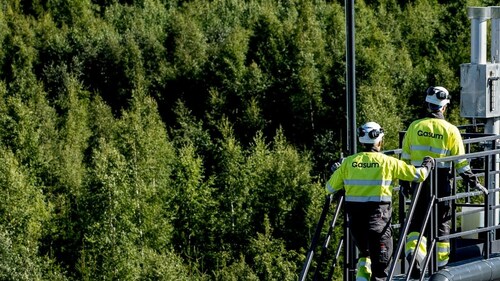
Gasum's Riihimäki biogas plant in Finland is undergoing a significant conversion to enhance production efficiency, focusing on digestate treatment. The EUR 7.5 million investment aims to increase biogas production, promote renewable energy, and recycle nutrients. The project includes an advanced evaporation system to remove liquid efficiently, recover nitrogen as ammonium water, and reduce transportation costs and emissions. Gasum plans to bring 7 TWh of renewable gas to the market by 2027, reducing 1.8 million tons of carbon dioxide yearly. The expansion aligns with environmental goals and sustainable practices, with support from the Finnish Ministry of the Environment.
To enhance production efficiency, Gasum’s Riihimäki biogas plant in Finland is undergoing a significant conversion focused on the treatment of the digestate. The project demonstrates Gasum’s commitment to increasing the production of biogas to bring more renewable energy to the market and at the same time promoting the use of recycled nutrients.
Nordic energy company Gasum has decided to invest EUR 7.5 million in a project aimed at expanding and enhancing the current biogas plant in Riihimäki, Finland. Operational since 2016, the plant contributes around 45 gigawatt hours (GWh) of biomethane annually to the gas transmission network, meeting industrial and transportation needs for renewable energy.
The project's objective is to implement an advanced evaporation system to remove liquid more efficiently from the digestate generated during biogas production. This addition to the plant process not only boosts operational efficiency but also allows for the recovery of nitrogen in the form of valuable ammonium water.
“The plant primarily processes biowaste, sewage sludge and industrial side streams and the resulting digestate has traditionally been utilized in agriculture, providing essential nutrients to the farming as fertilizer. However, the utilization of digestate has faced challenges due to recently revised fertilizer regulations,” says Ari Suomilammi, Gasum’s Head of Renewable Gas.
Significant reductions in transportation costs and associated emissions
The investment includes an evaporator to remove excess water and a reverse osmosis system to separate and recover valuable nutrients from the digestate. The resulting product is a solid digestate, resembling soil, suitable for agricultural use and landscaping. Additionally, the thick concentrate can be utilized as fertilizer and the produced ammonium water in industrial processes.
In the context of emission reductions, the investment involves the production of an ammonia solution containing organic nitrogen, strategically replacing nitrogen of fossil origin, specifically urea. Using this substitute is important in reducing carbon dioxide emissions. It helps to decrease about 1,000 tons of emissions every year when compared to making regular urea.
“The removal of approximately 40,000 tons of water annually translates to a significant reduction in transportation costs and associated emissions, sparing the need for a thousand truckloads a year. This not only contributes to environmental sustainability but also enhances the economic viability of the plant,” Ari Suomilammi says.
Gasum continues to invest in clean biogas production
Increasing the output of existing biogas plants aligns with Gasum’s strategic goal to bring seven terawatt hours (7 TWh) of renewable gas yearly to the market by 2027, resulting in a yearly cumulative carbon dioxide reduction of 1.8 million tons for Gasum’s customers.
The Riihimäki biogas plant's innovative evaporator investment not only addresses current challenges in digestate utilization but also aligns with broader environmental goals.
“This investment reflects a commitment to sustainable practices and serves as a model for future biogas facilities looking to enhance their environmental impact. It is not only a question of reducing emissions but also advancing the use of digestate in a manner that is beneficial for the climate and environment,” Ari Suomilammi says.
The decision to invest in the Riihimäki expansion was made in January 2024, initiating the planning and procurement phase. The aim is to have the expansion operational by May 2025. The project has received a grant of 40% of the investment sum from the Finnish Ministry of the Environment, emphasizing the government's commitment to supporting projects advancing the circular economy.